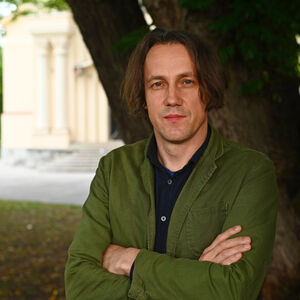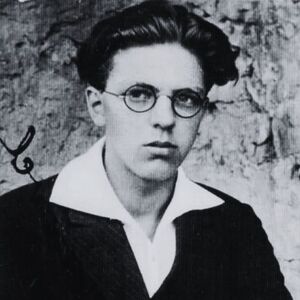-
Peter Mlakar

Peter Mlakar (1951) is a philosopher, writer, performer, member of Neue Slowenische Kunst (NSK, Department of Pure and Applied Philosophy) and an associate of the music group Laibach. He also participated in projects by 300 000 Verschiedene Krawalle (Laibach Kunst division), the CD Peter– Paracelsus, PeterParadox, the IRWIN art group, the Noordung Theatre and various undertakings by NSK State and New Collectivism. He regularly lectures and carries our performances Točka G kot umetniško delo (G Spot as an Artwork), Spoved (Confession), Tri oblike absolutnega zla (Three Forms of Absolute Evil). He completed a degree in philosophy and comparative literature and worked as an editor at the journal Problemi, was president of ŠKUC, Head of the Section for Publishing at the University Student Organisation, a TV preacher on national TV. In his work he looks at classical philosophical themes and their anomalies, for example the question of God in relation to a scientificised, technologicised and cyberneticised world; erotica and transendence; pleasure and evil; mysticism with science. His books include Hribi in doline (Hills and Valleys) (NSK, 1999), Omračitev uma (The Darkening of the Mind) (NSK, 2007), Mišljenje, ki to ni (Thinking, When It Isn't) (NSK, 2014), Vojna (War) (NSK, 2011).
-
Peter Svetina

Peter Svetina (1970) was born in Ljubljana. He studied Slavic studies in Ljubljana and Prague, and for the last two decades literature at the University of Klagenfurt. His research focuses on poetry and young adult literature, and recently also on themes such as dialogue in young adult literature, creativity and writing, and the cultural history of tea. He also translates from Czech, Croatian, Serbian and German into Slovene and does editorial work. He writes mostly for children and young readers. Among his most popular works are Modrost nilskih konjev (The Wisdom of Hippos) (DZS, 2010), Ropotarna (Storeroom) (Miš, 2012), Mrožek, mrožek (The Little Walrus) (Mladinska knjiga, 2013), Kako zorijo ježevci (The Ripening of Porcupines) (Miš, 2015), Sosed pod stropom (Neighbour Under the Ceiling) (Sodobnost, 2016) and Modri Portugalec (The Blue Portuguese) (Sodobnost, 2021). In 2020 and 2022 he was among the finalists for the Hans Christian Andersen Award.
-
Renata Salecl

Renata Salecl (1962) is a philosopher and sociologist. She works at the Institute of Criminology at University of Ljubljana and at Birkbeck College of the University of London. She was guest lecturer at numerous universities around the world. She is a member of the Slovenian Academy of Sciences and Arts and an honorary citizen of Ljubljana. In her books she analyses contemporary individualist society, the problems of anxiety, burnout, apathy and similar psychological problems of our times. She also focuses on the analysis of the ideology of choice on which the neoliberal capitalism is based. Her most recent books look at the problem of ignoring the truth and facts during a time when fake news and conspiracy theories are on the rise. In her book she particularly analyse what social mechanism affect the rise of violence, what makes more and more people apathetic and what influences the rise in identification with authoritarian leaders. She is author of twelve books. Most notable among them are A Passion for Ignorance: What we choose not to know and why (Princeton University Press, 2020), Tyranny of Choice (Profile, 2011), On Anxiety (Routledge, 2004) and (Per)versions of love and hate (Verso, 1998).
-
Robert Simonišek

Robert Simonišek (1977), writer, poet and art historian, studied philosophy and art history in Ljubljana and Graz. He holds a PhD in art history. So far he has published four volumes of poetry Potopljeni katalog (The Sunken Catalogue) (LUD Literatura, 2003), Avtoportret brez zemljevida (A Self-Portrait Without a Map) (LUD Literatura, 2008), Selitve (Migrations) (LUD Literatura, 2013), and Kar dopuščajo čuti (What the Senses Allow) (Mladinska knjiga, 2020), a collection of short stories Melanholična zrenja (Melancholic Gazes) (Litera, 2010), a monograph Slovenska secesija, (The Slovene Secession) (Slovenska matica, 2011), a novel Soba pod gradom (A Room Below the Castle) (Litera, 2013), and two collections of essays Trk prostorov (Crash of Spaces) (Litera, 2017) and Pejsaži – sanjati na soncu (Paysages – Dreaming in the Sun) (Družina, 2021). Both collections won the Rožanc Award, Slovenia’s national prize for the best collection of essays. In his literary works he interweaves travel motifs with existential questions and the author's individual experience of nature and art. His texts have been translated into various languages and have appeared in a number of anthologies.
-
Roman Rozina

Roman Rozina (1960) comes from Zasavje and studied journalism in Ljubljana. He worked at a local newspaper, the national broadcaster, was an independent journalist, worked for the Development Agency, and is now a freelance writer. For over 25 years he has been involved in journalism and research connected with the present and past of the Zasavje region. So far he has published seven novels and two collections of short stories. His second novel Galerija na izviru Sončne ulice (Gallery at the Source of Sunny Street) (Modrijan, 2010), the main theme of which is art, was nominated for the 2011 Kresnik Award for best Slovene novel. His fourth novel, Županski kandidat Gams (Mayoral Candidate Gams) (Cankarjeva založba, 2012), the story of the rise and fall of a political dilettante, won the Modra Ptica Award in 2014. He was once again nominated for the Kresnik Award with his novel Zločin in ljubezen (Crime and Love) (Modrijan, 2016), which looks at the position of books today, and he won the Kresnik Award in 2022 for Sto let slepote (A Hundred Years of Blindness) (Mladinska knjiga, 2021), in which he describes the events of the twentieth century in the form of a family chronicle. His latest novel, Tujintuj (Mladinska knjiga, 2023) is a story about refugees and the rejection of differences among people.
-
Samira Kentrić

Samira Kentrić (1976) is the author of three graphic novels, an autobiographic novel about growing up during the time of transition Balkanalije (Balkanalia) (Beletrina, 2015), an engaging story about the fate of refugees making their way to the EU Pismo Adni (A Letter to Adna) (Beletrina, 2016), and a novel about finding one’s place in society after tragic events Adna (Mladinska knjiga, 2020). Beside her graphic novels, she creates articles, book covers and illustrations in which she blends public and political language with the intimacy of people's everyday life. In 2015 her book Balkanalije received the international publishers MGA Special Book Award. In 2019 the Bulgarian translation of Balkanalije was included in the annual Economy Sofia selection of 15 best books published in Bulgaria. In 2022 the German Academy for Children's and Youth Literature chose the German translation of Balkanalije as the YA book of the month and in 2023 the book trade magazine Börsenblatt included it in their list of 14 recommended books translated from Slovene. Last year her front cover design for the street newspaper Kralji ulice won the public’s choice award for Best Cover of the Year from the International Network of Street Papers.
-
Sara Belin

Sara Belin was born in Ljubljana where she studied the piano and solo singing. She was first Slovene to study opera singing at the Hans Eilser Acadeny of Music in Berlin, performing in leading roles in a number of operas as a student. Health issues brought an early end to her promising career as a soprano. In 2010 her debut novel December Moon was published by Sanje publishing house in Slovenia. Three years later she published her first novel in German entitled Bittersweet Moon, which reached the top of the Kindle bestsellers list. In 2018 her novel The Millionaire’s Game (Montlake Romance, 2018) came fourth in the bestseller chart of Amazon Germany. She has recently published a trilogy of erotic novels: Rockstar Crush (dp Verlag). Over the last year she has taken on writing two plays that are to be staged in German theatres and is currently also working on a new novel.
-
Slavko Grum

When Slavko Grum died in 1949 at the age of 49, he left behind a literary oeuvre that had received little attention until then: a medical practitioner, he wrote and published mainly between 1920 and 1935. His short fiction was initially published exclusively in periodicals. Of his many plays (only four have survived), two of them received public attention during his lifetime - today they are among the founding texts of 20th century Slovenian literature. He is considered the Slovenian Kafka.
-
Slavoj Žižek

Slavoj Žižek (1949) is a communist philosopher and political activist. He received his PhD from the University of Ljubljana in 1981 and from the Université Paris VIII in 1985. He has been working as a senior researcher at the Department of Philosophy, University of Ljubljana, and as co-director at the International Centre for Humanities, Birkbeck University, University of London. Žižek is known for his reading of Hegel through the theory of Lacan, a materialist interpretation of Christianity, and a communist critique of liberal democracy. He is a widely translated and globally read author who has written dozens of books, including The Sublime Object of Ideology (Verso, 1989) and more recently Hegel in a Wired Brain (Bloomsbury, 2021). He has also made documentary films (Less Than Nothing, The Pervert’s Guide to Cinema, The Pervert’s Guide to Ideology) and written numerous commentaries in world media.
-
Srečko Kosovel

Srečko Kosovel (b. 1904 in Sežana, d. 1926 in Tomaj) studied Slavic studies, Romance studies and pedagogy in Ljubljana. He prepared a first volume of poetry, which was never published. He was influenced by Nietzsche and Karl Marx, among others, his works were rediscovered only in the 1960s.
Complete works: Vsem naj bom neznan (To All I Shall Remain Unknown, 2019). In German: Integrale, Wieser, 1999 (tr. Erwin Köstler), Mein Gedicht ist mein Gesicht, Edition Thanhäuser, 2004 (tr. Ludwig Hartinger, new edition 2023 by Otto Müller Verlag) and poems in the anthology Mein Nachbar auf der Wolke; Slowenische Lyrik des 20. und 21. Jahrhunderts (Carl Hanser Verlag & Deutsche Akademie für Sprache und Dichtung, 2023).









 RSS
RSS
